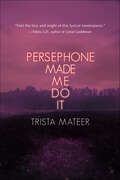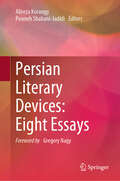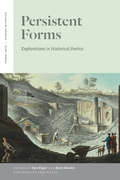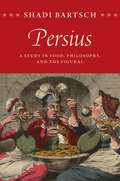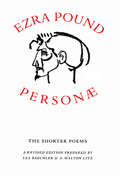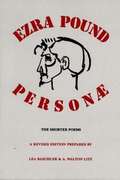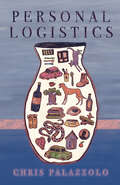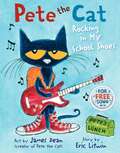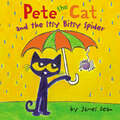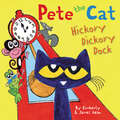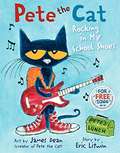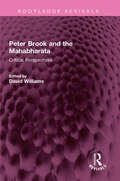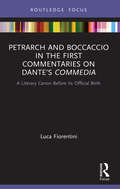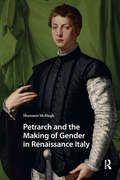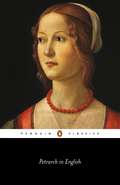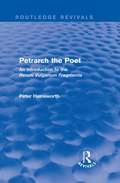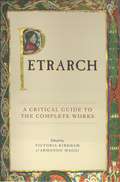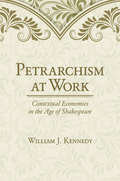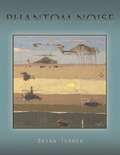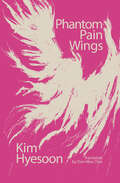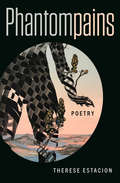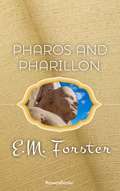- Table View
- List View
Persephone Made Me Do It (Myth and Magick #3)
by Trista MateerBestselling and Goodreads Choice Award-winning author Trista Mateer returns with another mythical approach to self-care in her newest poetry collection, Persephone Made Me Do It. Following her previous work in this series, Mateer weaves together mythology, tarot, poetry, and conversation to reveal a new side of a very old story. Alternating between the perspectives of poet and goddess, Persephoneís lore is explored, related to modern issues, and ultimately reclaimed.ìYou want to talk about duality? You want to talk about love? Let us speak instead of chaos.î In this new collection of art and feminist verse from Trista Mateer, Persephone might have flowers in her hairóbut she is out for blood. This is the third book in the Myth & Magick series, which also includes Aphrodite Made Me Do It and Artemis Made Me Do It.
Persian Literary Devices: Eight Essays
by Azadeh VatanpourThis volume offers a glimpse into the rich tradition of literary devices in Persian language and literature. It establishes an incontrovertible connection between literary devices - figurative language, rhetoric, and so on - and pedagogy and poetics in both written and oral expression. The essays offer a detailed and thorough overview of some of these literary devices and their dynamics, which have helped make the Persian literary tradition a force to reckon with. The essays also carve out a space dedicated to colloquialisms and idioms, as they are interwoven into the fabric of Persian culture— within the larger field of rhetoric. These devices are fostered and furthered in their potency, both culturally and linguistically, by the poets, writers, and rhetoricians who utilize them. The essays highlight a culture and history in texts and oral history that further speak to a culturally tailored complexity as per figurative language, idioms, colloquialisms, and therhetoric they help found and/or re-define. These discussions and analyses further facilitate an understanding of the epistemological and cultural meaning of some of the constituents of what is otherwise a Persian identity. This work is a must-have for scholars and students of Persian, Arabic, Ottoman, and Urdu literature, not to mention Middle Eastern history and cultural poetics enthusiasts.
Persistent Forms: Explorations in Historical Poetics (Verbal Arts: Studies in Poetics)
by Ilya Kliger and Boris MaslovSince the mid-1980s, attempts to think history and literature together have produced much exciting work in the humanities. Indeed, some form of historicism can be said to inform most of the current scholarship in literary studies, including work in poetics, yet much of this scholarship remains undertheorized.Envisioning a revitalized and more expansive historicism, this volume builds on the tradition of Historical Poetics, pioneered by Alexander Veselovsky (1838–1906) and developed in various fruitful directions by the Russian Formalists, Mikhail Bakhtin, and Olga Freidenberg. The volume includes previously untranslated texts of some of the major scholars in this critical tradition, as well as original contributions which place that tradition in dialogue with other thinkers who have approached literature in a globally comparatist and evolutionary-historical spirit. The contributors seek to challenge and complement a historicism that stresses proximate sociopolitical contexts through an engagement with the longue durée of literary forms and institutions. In particular, Historical Poetics aims to uncover deep-historical stratifications and asynchronicities, in which formal solutions may display elective affinities with other, chronologically distant solutions to analogous social and political problems.By recovering the traditional nexus of philology and history, Persistent Forms seeks to reinvigorate poetics as a theoretical discipline that would respond to such critical and intellectual developments as Marxism, New Historicism, the study of world literature, practices of distant reading, and a renewed attention to ritual, oral poetics, and genre.
Persius: A Study in Food, Philosophy, and the Figural
by Shadi BartschThe Roman poet and satirist Persius (34–62 CE) was unique among his peers for lampooning literary and social conventions from a distinctly Stoic point of view. A curious amalgam of mocking wit and philosophy, his Satires are rife with violent metaphors and unpleasant imagery and show little concern for the reader’s enjoyment or understanding. In Persius, Shadi Bartsch explores this Stoic framework and argues that Persius sets his own bizarre metaphors of food, digestion, and sexuality against more appealing imagery to show that the latter—and the poetry containing it—harms rather than helps its audience. Ultimately, he encourages us to abandon metaphor altogether in favor of the non-emotive abstract truths of Stoic philosophy, to live in a world where neither alluring poetry, nor rich food, nor sexual charm play a role in philosophical teaching.
Personae: The Shorter Poems (Revised Edition)
by Ezra Pound A. Walton Litz Lea BaechlerA new edition of Pound's groundbreaking shorter poems. If the invention of literary modernism is usually attributed to James Joyce, T. S. Eliot and Ezra Pound, it was Pound alone who provided (in Hugh Kenner's words) "the synergetic presence") to convert individual experiment into an international movement. In 1926 Pound carefully sculpted his body of shorter poems into a definitive collection which would best show the concentration of force, the economy of means, and the habit of analysis that were, to him, the hallmarks of the new style.This collection, where Pound presented himself in a variety of characters or "masks," was called Personae. In 1926, Personae's publication gave solidity to a movement today the work stands as one of the classic texts of the twentieth century. Pound scholars Lea Baechler (of Columbia) and A. Walton Litz (Holmes Professor of English Literature at Princeton) have prepared a corrected text and supplied an informative "Note on the Text" explaining both Pound's original criteria for his selection and the volume's subsequent history.
Personae: The Shorter Poems of Ezra Pound
by Ezra Pound A. Walton Litz Lea BaechlerIf the invention of literary modernism is usually attributed to James Joyce, T. S. Eliot and Ezra Pound, it was Pound alone who provided (in Hugh Kenner's words) "the synergetic presence") to convert individual experiment into an international movement. In 1926 Pound carefully sculpted his body of shorter poems into a definitive collection which would best show the concentration of force, the economy of means, and the habit of analysis that were, to him, the hallmarks of the new style. This collection, where Pound presented himself in a variety of characters or "masks," was called Personae. In 1926, Personae's publication gave solidity to a movement today the work stands as one of the classic texts of the twentieth century. Pound scholars Lea Baechler (of Columbia) and A. Walton Litz (Holmes Professor of English Literature at Princeton) have prepared a corrected text and supplied an informative "Note on the Text" explaining both Pound's original criteria for his selection and the volume's subsequent history.
Personal Logistics
by Chris PalazzoloPersonal Logistics is a collection about men and industry, about enterprise and survival, and about the insignificance of the individual in place and time. The collection details the poet' s experiences and observations of life in the East Kimberley, as someone who has worked as a farmhand and as a stay-at home dad. Coursing through the collection, in both the wet season and the dry, is the theme of the relation between naturally flowing water and hydroelectricity, without which Kununurra, where the poet resides, would be considerably less hospitable.
Personals
by Ian WilliamsThese are not love poems. These are almost-love poems. Jittery, plaintive, and fresh, these are poems voiced through a startling variety of speakers who continually rev themselves up to the challenge of connecting with others, often to no avail. Ian Williams writes in traditional poetic forms: ghazals, a pantoum, blank sonnets, mock-heroic couplets. He also invents his own: poems that spin into indeterminacy, poems that don’t end. With a deft hand and playful ear, Williams entices the reader to stumble alongside his characters as they search, again and again, for intimacy, for love, and for each other.
Peru
by Herbert MorrisThis book is a collection of poems by the author that appeared in various journals and on various topics.
Pete the Cat Rocking in My School Shoes: A Back To School Book For Kids (Pete The Cat Ser.)
by Eric LitwinPete the cat wears his school shoes while visiting the library, the lunchroom, the playground, and more while singing his special song.
Pete the Cat and the Itsy Bitsy Spider (Pete the Cat)
by Kimberly Dean James DeanPete the Cat’s cool adaptation of the classic children’s song "Itsy Bitsy Spider" will have have young readers laughing and singing along.The itsy bitsy spider climbed up the water spout. Down came the rain....As the itsy bitsy spider struggles, Pete and his friends know just what to do to help out!Fans of James Dean's #1 New York Times bestselling Pete the Cat will love rocking out with Pete.
Pete the Cat: Hickory Dickory Dock (Pete the Cat)
by Kimberly Dean James Dean#1 New York Times bestselling creators James and Kimberly Dean put a groovy spin on the classic children’s song “Hickory Dickory Dock” with everyone’s favorite cool cat.Hickory dickory dock. Pete the Cat went up the clock!The clock struck one. The cat went down. Hickory dickory dock!Sing along with Pete the Cat as he rocks out to this classic tune with a supercool twist in this paper-over-board picture book.
Pete the Cat: Rocking in my School Shoes (Into Reading, Big Book Module 1)
by Eric Litwin James DeanNIMAC-sourced textbook <P><P>Time to head back to school with this bestselling groovy Pete the Cat book! <P><P>Pete the Cat is rocking in his school shoes. Pete discovers the library, the lunch room, the playground, and lots of other cool places at school. And no matter where he goes, Pete never stops moving and grooving and singing his song...because it’s all good. <P><P>The fun never stops—download the free groovin’ song. <P><P>Lexile Measure: AD430L
Peter Brook and the Mahabharata: Critical Perspectives (Routledge Revivals)
by David WilliamsFirst published in 1991, Peter Brook and the Mahabharata is a collection of essays which contextualizes the production of Peter Brook’s The Mahabharata. Written by both scholars and collaborators on Brook’s production, these essays seek not only to discuss such issues as the politics of theatre interculturalism, but to describe the nature of the working process, and detail the technical problems engendered by touring a production of this size and complexity. Furnished with a new preface by the editor, the book continues to be crucial research work devoted to unravelling the mesmerising as well as the polarising enigma known as Peter Brook’s The Mahabharata. Thoroughly heterogenous and controversially irreverent, this book will be of interest to students of theatre, performance art, literature, South Asian studies and media studies.
Petrarch and Boccaccio in the First Commentaries on Dante’s Commedia: A Literary Canon Before its Official Birth (Young Feltrinelli Prize in the Moral Sciences)
by Luca FiorentiniThis text proposes a reinterpretation of the history behind the canon of the Tre Corone (Three Crowns), which consists of the three great Italian authors of the 14th century – Dante, Petrarch, and Boccaccio. Examining the first commentaries on Dante’s Commedia, the book argues that the elaboration of the canon of the Tre Corone does not date back to the 15th century but instead to the last quarter of the 14th century. The investigation moves from Guglielmo Maramauro’s commentary – circa 1373, and the first exegetical text in which we can find explicit quotations from Petrarch and Boccaccio – to the major commentators of the second half of the 14th century: Benvenuto da Imola, Francesco da Buti and the Anonimo Fiorentino. The work focuses on the conceptual and poetic continuity between Dante, Petrarch, and Boccaccio as identified by the first interpreters of the Commedia, demonstrating that contemporary readers and intellectuals immediately recognized a strong affinity between these three authors based on criteria not merely linguistic or rhetorical. The findings and conclusions of this work are of great interest to scholars of Dante, as well as those studying medieval poetry and Italian literature.
Petrarch and the Making of Gender in Renaissance Italy (Gendering the Late Medieval and Early Modern World)
by Shannon McHughThis book is a new history of early modern gender, told through the lyric poetry of Renaissance Italy. In the evolution of Western gender roles, the Italian Renaissance was a watershed moment, when a confluence of cultural developments disrupted centuries of Aristotelian, binary thinking. Men and women living through this upheaval exploited Petrarchism’s capacity for subjective expression and experimentation - as well as its status as the most accessible of genres - in order to imagine new gendered possibilities in realms such as marriage, war, and religion. One of the first studies to examine writing by early modern Italian men and women together, it is also a revolutionary testament to poetry’s work in the world. These poets’ works challenge the traditional boundaries drawn around lyric’s utility. They show us how poems could be sites of resistance against the pervading social order - how they are texts capable not only of recording social history, but also of shaping it.
Petrarch in English
by Thomas RocheFranceso Petrarch (1304-1374), creator of the sonnet form, remained for more than three hundred years the most influential poet in Europe, his works more widely read than even those of Dante. This collection contains English language versions of his poems from across six centuries, in a wide variety of translations and reinterpretations. Spanning the Trionfi series and the Canzoniere - Petrarch's empassioned sonnet-sequence concerning his beloved Laura - it also includes great English poems influenced by Petrarch. From Chaucer's early adaptation of a Petrarchan sonnet in Troilus and Criseyde to the sixteenth century translations by the Earl of Surrey, Byron's mocking consideration of the Canzoniere in Don Juan and Ezra Pound's parody Silet, all provide a unique insight into the significance of the founder of the European lyric tradition.
Petrarch the Poet: An Introduction to the 'Rerum Vulgarium Fragmenta' (Routledge Revivals)
by Peter HainsworthIn this critical and historical interpretation of Petrarch’s major Italian work, the collection of poems he called the Rerum vulgarium fagmenta, Peter Hainsworth presents Petrarch as a poet of outstanding sophistication and seriousness, occupied with issues which are still central to debates about poetry and language. In the Rerum vulgarium fragmenta Petrarch reformed the received Italian tradition, creating a new kind of lyric poetry. In particular, he found solutions to the intellectual, linguistic and imaginative problems which Dante’s Divine Comedy posed for the succeeding generation of poets. Petrarch the Poet illumines the complexities of Petrarch’s poetic vision, which is simultaneously a form of autobiographical narrative, a poetic encyclopaedia and a meditation on the nature of poetry. The book will appeal to Italian specialists, to those interested in European poetry of the Middle Ages and the Renaissance, and also to readers interested generally in the nature and function of poetry.
Petrarch: A Critical Guide to the Complete Works
by Victoria Kirkham and Armando MaggiAlthough Francesco Petrarca (1304–74) is best known today for cementing the sonnet’s place in literary history, he was also a philosopher, historian, orator, and one of the foremost classical scholars of his age. Petrarch: A Critical Guide to the Complete Works is the only comprehensive, single-volume source to which anyone—scholar, student, or general reader—can turn for information on each of Petrarch’s works, its place in the poet’s oeuvre, and a critical exposition of its defining features. A sophisticated but accessible handbook that illuminates Petrarch’s love of classical culture, his devout Christianity, his public celebrity, and his struggle for inner peace, this encyclopedic volume covers both Petrarch’s Italian and Latin writings and the various genres in which he excelled: poem, tract, dialogue, oration, and letter. A biographical introduction and chronology anchor the book, making Petrarch an invaluable resource for specialists in Italian, comparative literature, history, classics, religious studies, the Middle Ages, and the Renaissance.
Petrarchism at Work: Contextual Economies in the Age of Shakespeare
by William J. KennedyThe Italian scholar and poet Francesco Petrarch (1304–1374) is best remembered today for vibrant and impassioned love poetry that helped to establish Italian as a literary language. Petrarch inspired later Renaissance writers, who produced an extraordinary body of work regarded today as perhaps the high-water mark of poetic productivity in the European West. These "Petrarchan" poets were self-consciously aware of themselves as poets—as craftsmen, revisers, and professionals. As William J. Kennedy shows in Petrarchism at Work, this commitment to professionalism and the mastery of poetic craft is essential to understanding Petrarch's legacy.Petrarchism at Work contributes to recent scholarship that explores relationships between poetics and economic history in early-modern European literature. Kennedy traces the development of a Renaissance aesthetics from one based upon Platonic intuition and visionary furor to one grounded in Aristotelian craftsmanship and technique. Their polarities harbor economic consequences, the first privileging the poet’s divinely endowed talent, rewarded by the autocratic largess of patrons, the other emphasizing the poet’s acquired skill and hard work. Petrarch was the first to exploit the tensions between these polarities, followed by his poetic successors. These include Gaspara Stampa in the emergent salon society of Venice, Michelangelo Buonarroti in the “gift” economy of Medici Florence and papal Rome, Pierre de Ronsard and the poets of his Pléiade brigade in the fluctuant Valois court, and William Shakespeare and his contemporaries in the commercial world of Elizabethan and early Stuart London. As Kennedy shows, the poetic practices of revision and redaction by Petrarch and his successors exemplify the transition from a premodern economy of patronage to an early modern economy dominated by unstable market forces.
Phantom Noise
by Brian TurnerIn the aftermath of best-selling Here, Bullet, Brian Turner deftly illuminates existence as both easily extinguishable and ultimately enduring. These prophetic, osmotic poems wage a daily battle for normalcy, seeking structure in the quotidian while grappling with the absence of forgetting.
Phantom Pain Wings
by Kim HyesoonWinged ventriloquy—a powerful new poetry collection channeling the language of birds by South Korea’s most innovative contemporary writer An iconic figure in the emergence of feminist poetry in South Korea and now internationally renowned, Kim Hyesoon pushes the poetic envelope into the farthest reaches of the lyric universe. In her new collection, Kim depicts the memory of war trauma and the collective grief of parting through what she calls an “I-do-bird-sequence,” where “Bird-human is the ‘I.’” Her remarkable essay “Bird Rider” explains: “I came to write Phantom Pain Wings after Daddy passed away. I called out for birds endlessly. I wanted to become a translator of bird language. Bird language that flies to places I’ve never been.” What unfolds is an epic sequence of bird ventriloquy exploring the relentless physical and existential struggles against power and gendered violence in “the eternal void of grief” (Victoria Chang, The New York Times Magazine). Through intensely rhythmic lines marked by visual puns and words that crash together and then fly away as one, Kim mixes traditional folklore and mythology with contemporary psychodramatic realities as she taps into a cremation ceremony, the legacies of Rimbaud and Yi Sang, a film by Agnes Varda, Francis Bacon’s portrait of Pope Innocent X, cyclones, a princess trapped in a hospital, and more. A simultaneity of voices and identities rises and falls, existing and exiting on their delayed wings of pain.
Phantompains
by Therese EstacionTherese Estacion survived a rare infection that nearly killed her, but not without losing both her legs below the knees, several fingers, and reproductive organs. Phantompains is a visceral, imaginative collection exploring disability, grief and life by interweaving stark memories with dreamlike surrealism.Taking inspiration from Filipino horror and folk tales, Estacion incorporates some Visayan language into her work, telling stories of mermen, gnomes, and ogres that haunt childhood stories of the Philippines and, then, imaginings in her hospital room, where she spent months recovering after her operations.Estacion says she wrote these poems out of necessity: an essential task to deal with the trauma of hospitalization and what followed. Now, they are demonstrations of the power of our imaginations to provide catharsis, preserve memory, rebel and even to find self-love.Praise for Phantompains:"Phantompains is a text of rare power, birthing a brave new world flush with pain, lust, drugs and the uterus. Estacion's 'Eunuched Female' is a masterpiece: utterly indelible." —Tamara Faith Berger, author of Queen Solomon"I love Therese Estacion's book. I love its humour, clarity, irreverence, and rage. It's not a book about triumph (though she has triumphed), or perseverance (though she has persevered), or courage (though she has it). To me, it is a book about vision and reckoning, descent and return. Therese Estacion plunged into an abyss—found suffering, dehumanization, terror—and when she emerged, she chose to make radically confrontational art. Phantompains is the cosmic result of her dwelling, and her passage. In her words, "she became the subject"—I think she also became the seer." —Sara Peters, author of I Become a Delight to My Enemies
Pharos and Pharillon: Primary Source Edition (Abinger Edition Ser.)
by E M ForsterAlexandria, Egypt: at one point a trading hub and a cosmopolitan crossroads of the world. It was also the place where, during World War I, E.M. Forster fell in love with a young Egyptian man. Pharos and Pharillon is a collection of essays and articles he wrote about Alexandria, mostly written during that time and dedicated to that man, Mohammed el Adl.Organized in two parts, the book opens with Pharos and seven stories that paint a poetic picture of the ancient city and its history. The second half, Pharillon, consists of four stories, followed by Forster’s moving introduction of the Greek poet C. P. Cavafy to the English-speaking world. The division in the book is signaled by Cavafy’s now famous poem, “The God Abandons Antony.”The sketches were written for the local Egyptian press and were also published in The Nation and Athenaeum, a British political newspaper owned by Leonard Woolf, husband of writer Virginia Woolf. The Woolfs published Pharos and Pharillon in 1923, and with its poignant accounts of the events and history of one of the first global cities, it remains an enlightening portrait, and a useful guidebook, into modern times.
